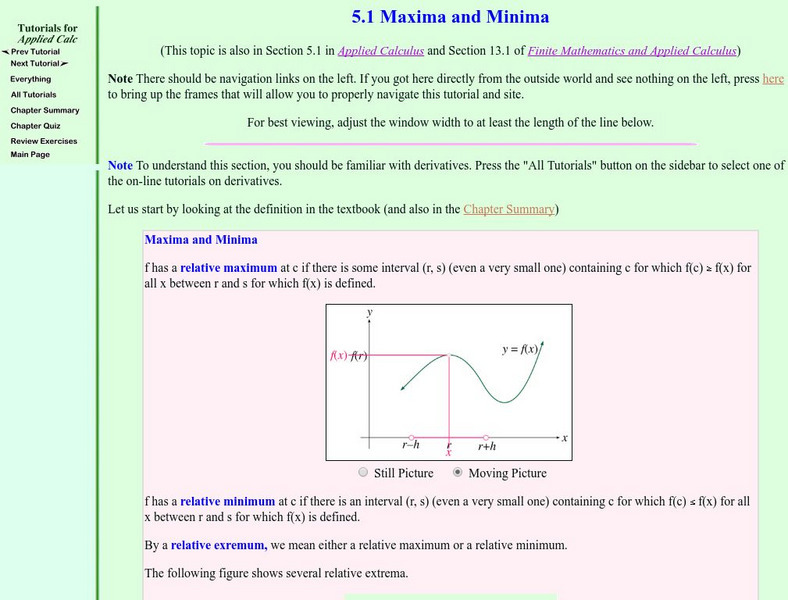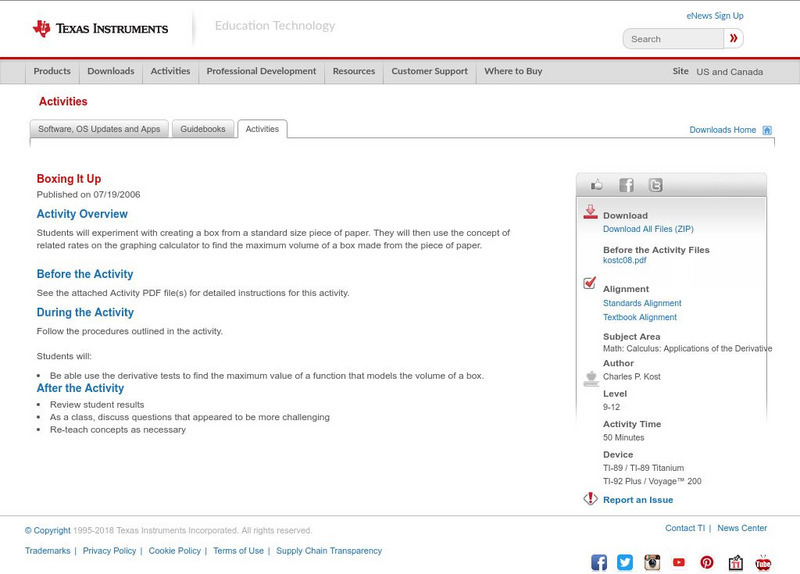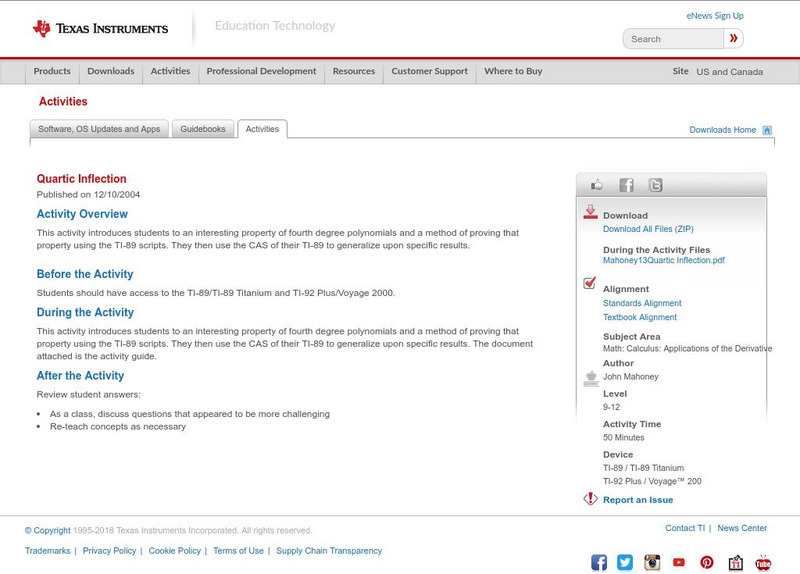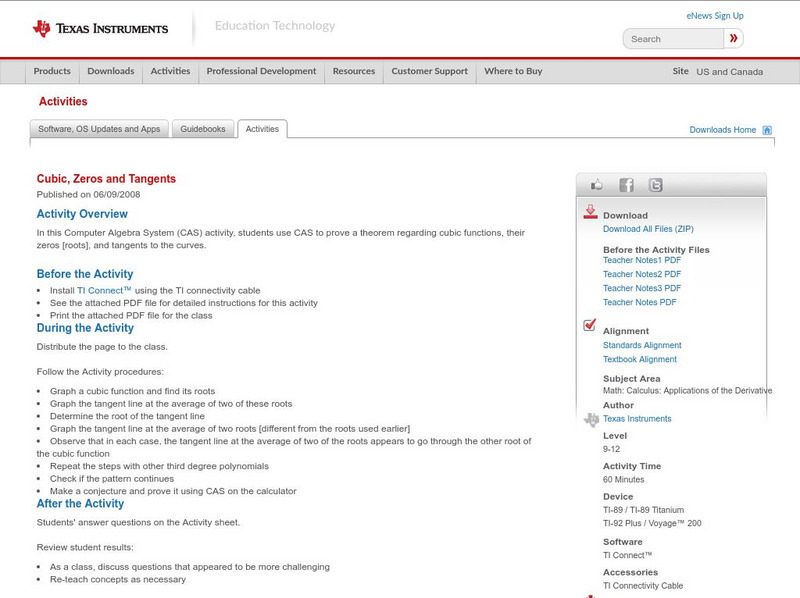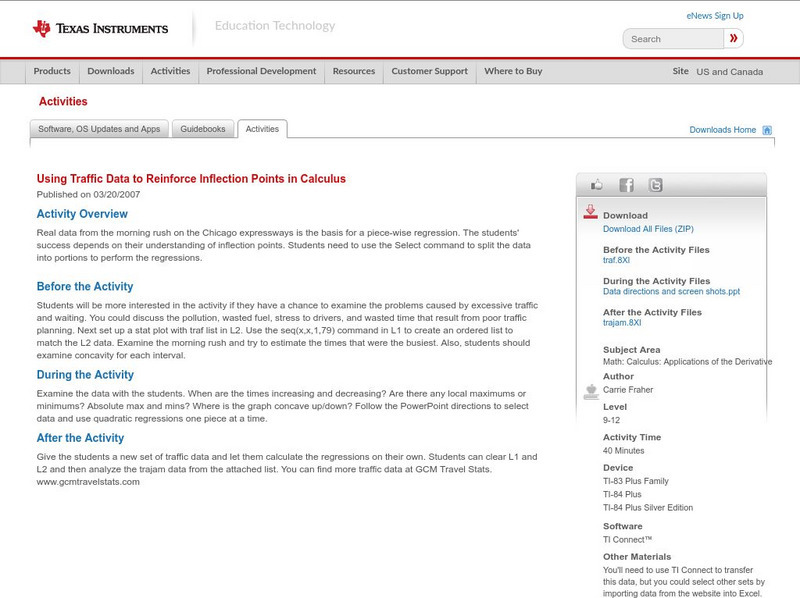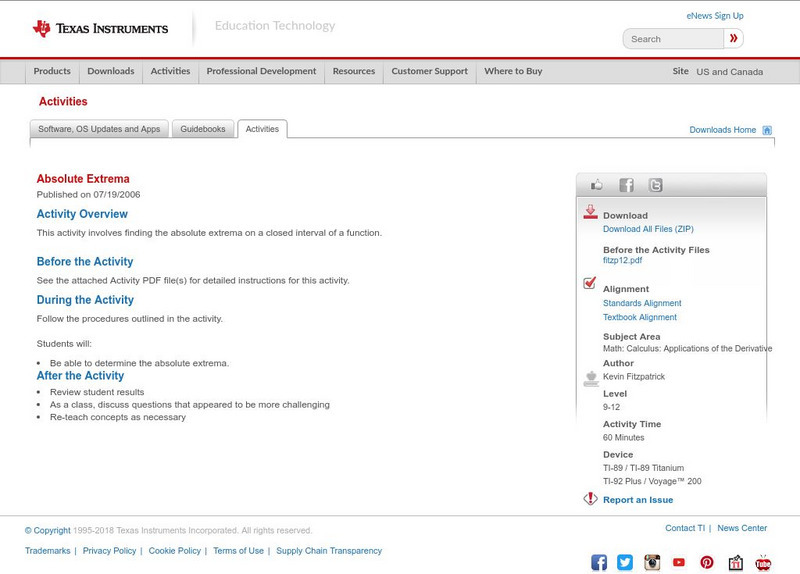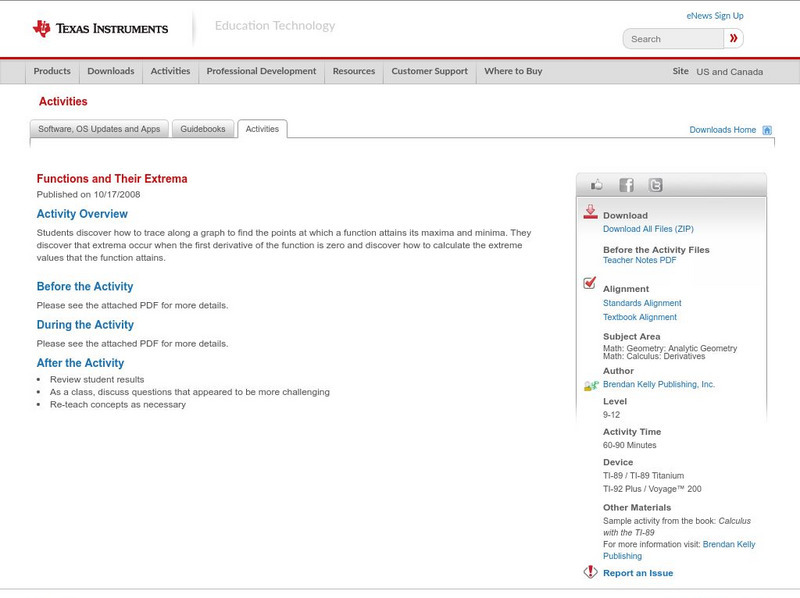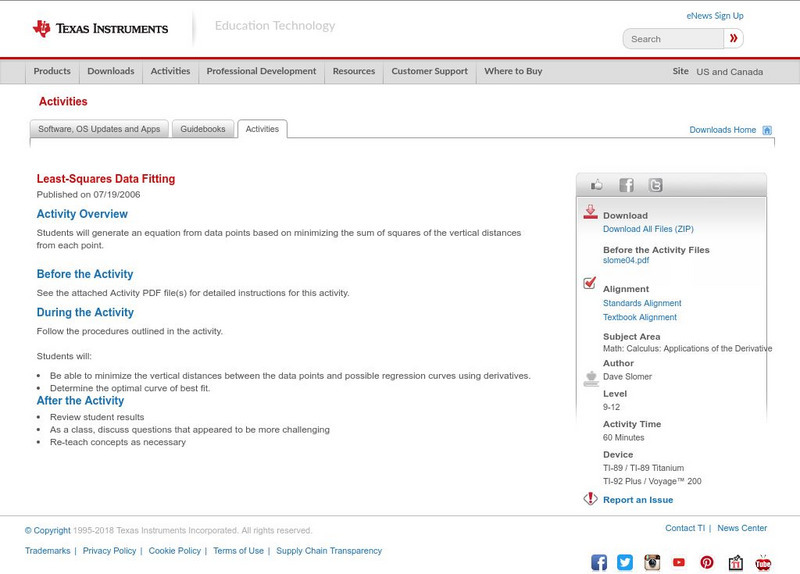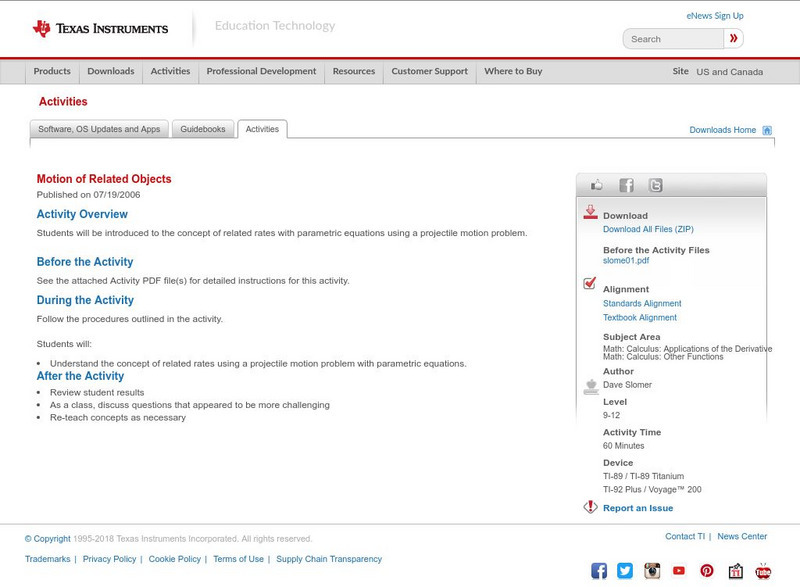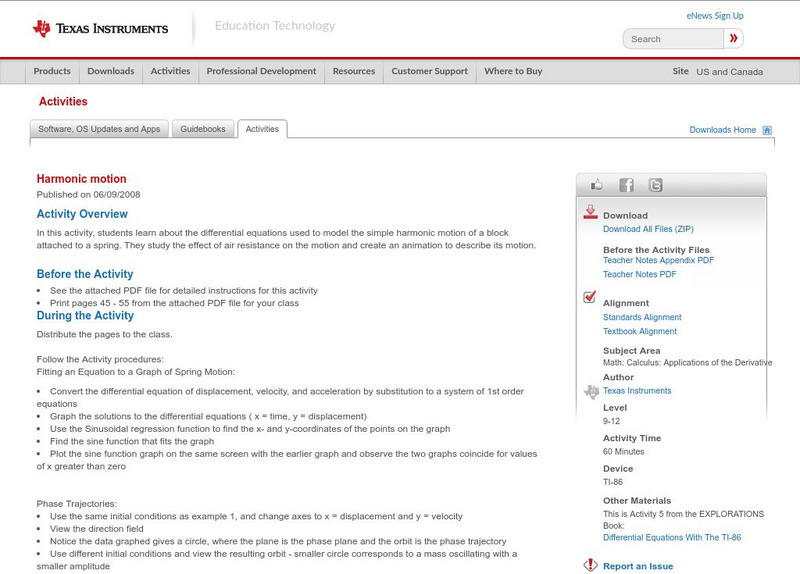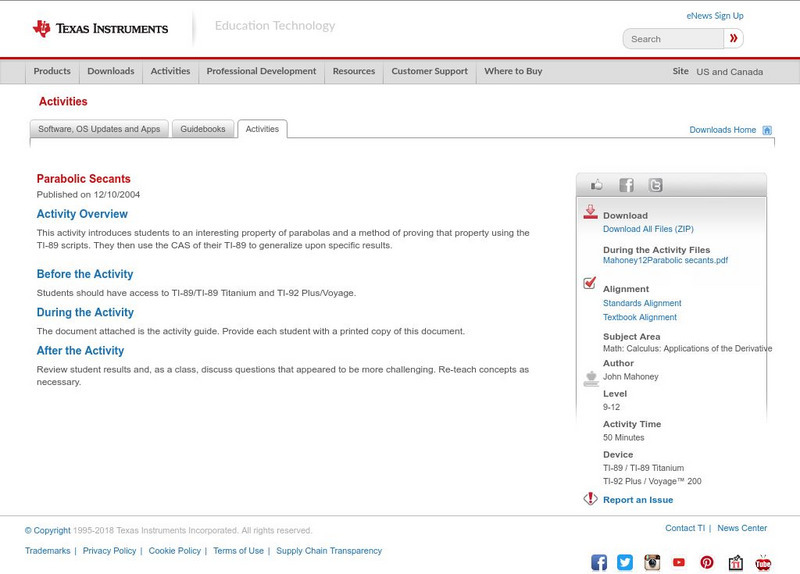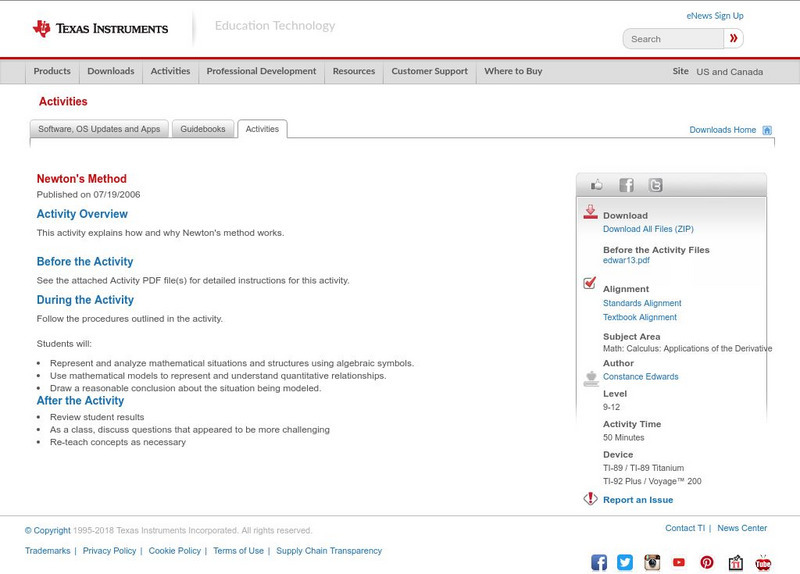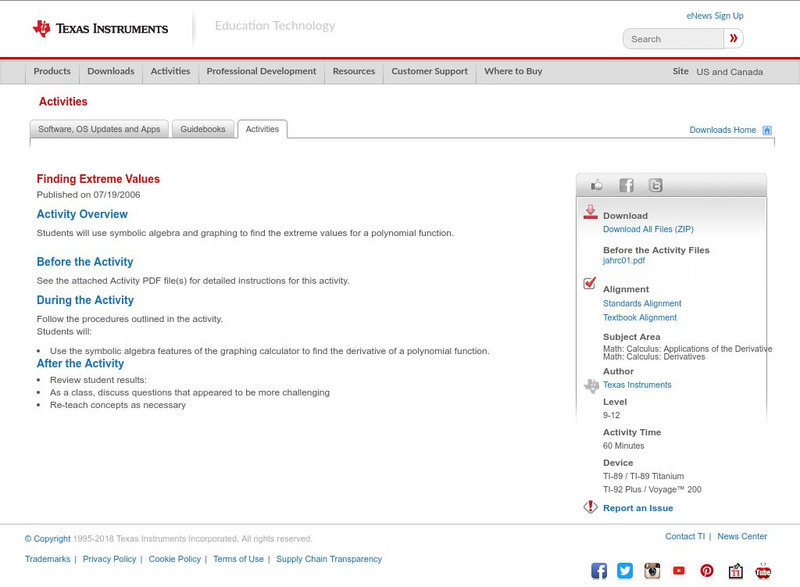Other
Matheno: How to Solve Optimization Problems in Calculus
Need to solve Optimization problems in Calculus? This blog illustrates the steps needed to solve them routinely for yourself.
Wolfram Research
Wolfram Math World: Law of Cosines
This page from MathWorld.com gives a good explanation of the Law of Cosines, which relates the lengths of the legs of a triangle to the angles. This site shows how the formula is derived, along with a triangle to clarify variables. Also...
Stefan Warner and Steven R. Costenoble
Finite Mathematics & Applied Calculus: Maxima and Minima
Students learn about applications of derivatives. Topics include maxima and minima. The tutorial explores the calculus concepts through notes and examples. A chapter quiz, review exercises, and chapter summary are included.
Texas Instruments
Texas Instruments: Boxing It Up
In this activity, students will experiment with creating a box from a standard size piece of paper. They will then use the concept of related rates on the graphing calculator to find the maximum volume of a box made from the piece of paper.
Texas Instruments
Texas Instruments: Quartic Inflection
This activity introduces students to an interesting property of fourth degree polynomials and a method of proving that property using the TI-89 scripts. They then use the CAS of their TI-89 to generalize upon specific results.
Texas Instruments
Texas Instruments: Differential Equations
In this activity, students analyze first order, second order, and autonomous systems of two first order differential equations.
Texas Instruments
Texas Instruments: Cubic, Zeros and Tangents
In this Computer Algebra System (CAS) activity, students use CAS to prove a theorem regarding cubic functions, their zeros [roots], and tangents to the curves.
Texas Instruments
Texas Instruments: Using Traffic Data to Reinforce Inflection Points in Calculus
Real data from the morning rush on the Chicago expressways is the basis for a piece-wise regression. The students' success depends on their understanding of inflection points. Students need to use the Select command to split the data...
Texas Instruments
Texas Instruments: Calculus and the Ti 89
The graphing calculator's symbolic capacities make it ideal for teachers and students of calculus. Here are some examples of how teachers and students can use the calculator to better understand calculus.
Texas Instruments
Texas Instruments: Absolute Extrema
This activity involves finding the absolute extrema on a closed interval of a function.
Texas Instruments
Texas Instruments: Functions and Their Extrema
Model the trajectory of the longest home run ever hit while studying extrema of functions on the TI-89. Another real-world problem in this activity involves minimizing the amount of tin used in a cylindrical tank. Following the worked...
Texas Instruments
Texas Instruments: Higher Order Differential Equations
In this activity, students use the calculator to graph the solution to a second-order and third-order differential equations. They convert higher order differential equations by substitution to a system of first order differential...
Texas Instruments
Texas Instruments: Logistic Growth, Differential Equations, Slope Fields
In this Computer Algebra System (CAS) activity, students investigate differential equations analytically, graphically and numerically and see relationships between the three approaches.
Texas Instruments
Texas Instruments: Parametric, Vector, Polar and 3 D Functions
In this activity, students investigate and graph parametric functions, vectors, polar functions, and 3D functions.
Texas Instruments
Texas Instruments: Least Squares Data Fitting
This activity will allow the student to generate an equation from data points based on minimizing the sum of squares of the vertical distances from each point.
Texas Instruments
Texas Instruments: Managing the National Debt
In this activity, the students will predict the national debt by using logistic growth. The students will find the current national debt and use it to make their predictions.
Texas Instruments
Texas Instruments: Approximate Solutions: Differential Equations
The base of the natural logarithm function, is called Euler's number, in honor of Leonhard Euler, a great Swiss mathematician. (Continued. See "before the activity.")
Texas Instruments
Texas Instruments: Motion of Related Objects
This activity introduces the concept of related rates with parametric equations using a projectile motion problem.
Texas Instruments
Texas Instruments: Harmonic Motion
In this activity, students learn about the differential equations used to model the simple harmonic motion of a block attached to a spring. They study the effect of air resistance on the motion and create an animation to describe its...
Texas Instruments
Texas Instruments: Parabolic Secants
This activity introduces students to an interesting property of parabolas and a method of proving that property using the TI-89 scripts. They then use the CAS of their TI-89 to generalize upon specific results.
Texas Instruments
Texas Instruments: Newton's Method
This activity explains how and why Newton's method works.
Texas Instruments
Texas Instruments: Optimization
This activity shows the student how to determine the optimal solution for maximum volume based on the box-with-no-top problem.
Texas Instruments
Texas Instruments: Mean Value Theorem
The student will be able to understand the Mean Value Theorem using numerical and graphical methods.
Texas Instruments
Texas Instruments: Finding Extreme Values
In this activity, students can use symbolic algebra and graphing to find the extreme values for a polynomial function.


